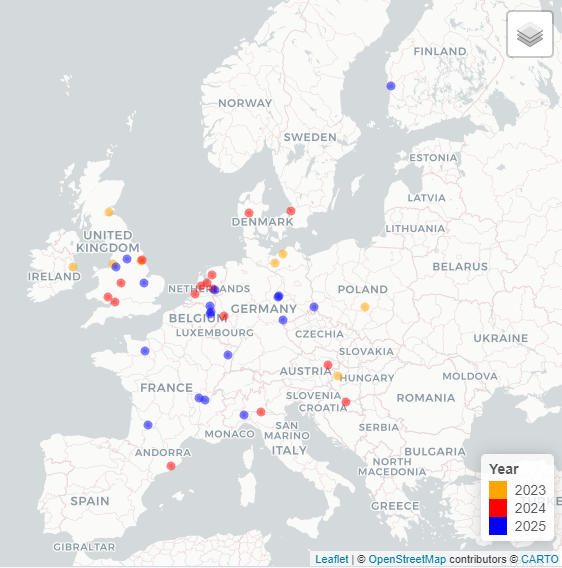The European plastics recycling sector is in deep crisis. By the end of 2025, nearly one million tonnes of recycling capacity will have been lost since 2023 – an amount equivalent to the recycling capacity of the whole of France.
In just the first seven months of 2025, almost as much capacity disappeared as in all of 2024, and by year’s end, closures will have tripled compared to 2023. Urgent political signal, paired with legislative measures, are needed to stop the collapse and protect Europe’s climate and circular economy goals.
The decline in industrial facilities weakens Europe’s strategic and resource independence, and undermines its global competitiveness. Yet the current crisis is only the tip of the iceberg. Beneath it lie far-reaching issues that have eroded the industry over time: increased unverified and low-priced imports of recycled plastics, high energy costs, falling demand for European recyclates, economic pressures, lax enforcement of regulations, and excessive red tape.
European recyclers face administrative burdens, including excessive paperwork and lengthy delays in obtaining and renewing recycling permits
The situation is dire. What is needed now is clear: policymakers must ensure that legislation directly addresses the competitiveness crisis facing plastics recyclers. Key pieces of legislation aimed at advancing circularity – such as the PPWR, the SUP Directive, the ELV Directive revision, and regulations concerning food contact applications – must move beyond ambition and be properly designed, to be implementable and consequently effectively enforced. A policy approach that is adaptive and responsive to evolving challenges is essential to support the sector.
Uncovering the iceberg: issues fueling Europe’s competitiveness & plastic recycling crisis
Among the most pressing challenges for the European plastics recycling value chain is the rise in plastic imports. More specifically, the lack of enforcement mechanisms for these has created loopholes where no verification takes place on whether the imported material is virgin or recycled, nor if these materials meet the same regulatory standards as materials produced in Europe.
Lower production costs abroad make it virtually impossible for European recyclers to remain competitive, while non-compliant imported plastics enter the Single Market unchecked and pose environmental and consumer risks. The war on tariffs, especially in the context of global polymer flows and existing overcapacities, may create further distortions on the European markets.
 In just the first seven months of 2025, almost as much capacity disappeared as in all of 2024, and by year’s end, closures will have tripled compared to 2023. Source: Plastics Recyclers Europe
In just the first seven months of 2025, almost as much capacity disappeared as in all of 2024, and by year’s end, closures will have tripled compared to 2023. Source: Plastics Recyclers Europe
Economic pressures, including high energy prices, are further reducing demand for European-produced plastic recyclates. Simultaneously, falling oil prices have made virgin plastics cheaper, luring converters away from recycled plastics. Recyclers are consequently left with growing volumes of unsold material.
Internally, European recyclers face administrative burdens, including excessive paperwork and lengthy delays in obtaining and renewing recycling permits. Combined with regulatory inconsistencies and limited enforcement of existing legislation, these issues discourage investment.
This not only risks the millions of euros dedicated to advancing circularity and improving recycling practices but also obstructs future developments and innovations in the sector.
Immediate action needed to reach safe waters
The crisis is not due to lack of ambition or technology. Europe’s recyclers are being outcompeted, undercut, and overregulated in their home market. To prevent the sector's collapse, the EU must act swiftly and decisively. Reviving demand for European recyclates, preventing further closures, and ensuring continued innovation all depend on a comprehensive response.
Trade defence tools are essential to shield the sector from non-compliant imports. These must include robust mirror clauses, stronger third-party verification, tariff adjustments for recycled plastics and products containing them, and reinforced customs controls backed by harmonised penalties for non-compliance and certification rules.
How Europe responds to this crisis will determine its ability to lead the global transition to sustainability, remain competitive, and uphold the values behind its policies
Simultaneously, European plastics recyclers need access to affordable, clean energy and targeted fiscal relief through subsidies and incentives. Harmonised Extended Producer Responsibility (EPR) schemes across Member States would strengthen local sourcing of recyclates and bring stability to the value chain.
Tackling raw material price volatility, accelerating and simplifying permitting processes, and streamlining reporting obligations would encourage the much-needed investments in the sector.
Consistency in implementing and enforcing existing EU legislation is equally vital. Recycled content targets in legislation – such as the PPWR and SUPD – must be upheld through third-party certification, legal clarity, and uniform application. These measures can help create a level playing field.
Plastics recycling is not a niche industry. It is a strategic sector for Europe’s autonomy, and a prerequisite for reaching climate and circular economy goals. How Europe responds to this crisis will determine its ability to lead the global transition to sustainability, remain competitive, and uphold the values behind its policies.
With immediate, coordinated, and forward-looking action, Europe can navigate this iceberg and enable its plastics recycling sector to grow.
Sign up to The Parliament's weekly newsletter
Every Friday our editorial team goes behind the headlines to offer insight and analysis on the key stories driving the EU agenda. Subscribe for free here.